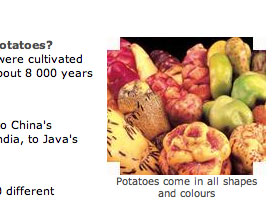Q: When is potato diversity not potato diversity?
A: When it is in the hands of assorted experts.
 I hate to be pedantic here. (Actually, that’s a terrible lie; I love to be pedantic, especially about crops and food.) But if you look closely at the photograph, and you know your tubers, you’ll know that those aren’t potatoes in the picture. They are oca and mashua. Andean tubers, to be sure, but not potatoes. So who made this elemental error? None other than the good folks at the International Year of the Potato.
I hate to be pedantic here. (Actually, that’s a terrible lie; I love to be pedantic, especially about crops and food.) But if you look closely at the photograph, and you know your tubers, you’ll know that those aren’t potatoes in the picture. They are oca and mashua. Andean tubers, to be sure, but not potatoes. So who made this elemental error? None other than the good folks at the International Year of the Potato.
Worse, it’s on the page specifically addressed “Hey, kids!” (Lord how I love that exciting exclamation mark.) One could, of course, argue that the caption just happens to be underneath a photo of other Andean tubers. But that won’t wash. What we have here is a total and abject failure to know anything whatsoever about potatoes. How can kids! trust anything else on the page?
I’m sure that the International Year of the Potato will be a good thing, just as the International Year of Rice was a good thing. I’m equally sure someone will eventually detect this egregious and appalling error. In the meantime, just to be on the safe side, I snapped the page and am preserving it here for posterity.
And hey, potato people, my rates remain reasonable.
 I hate to be pedantic here. (Actually, that’s a terrible lie; I
I hate to be pedantic here. (Actually, that’s a terrible lie; I